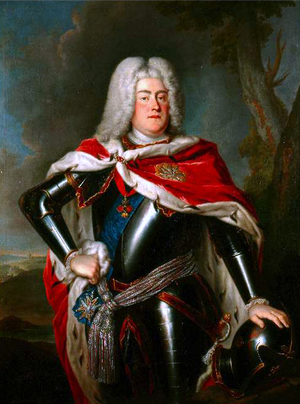1733 Polish–Lithuanian royal election
 | |||||||||||||
| |||||||||||||
| |||||||||||||
| |||||||||||||
The 1733 Polish–Lithuanian royal election was an election to decide on the new candidate for the Polish–Lithuanian throne.
History
On February 1, 1733, the King of Poland and Grand Duke of Lithuania
On September 12, 1733, the nobility, gathered in Wola near Warsaw, elected Leszczyński new king of Poland. In the popular vote, he received the support of 13,500 electors. This news was received in Paris with joy, but soon after the election, the new king had to flee to Gdańsk, where he awaited French military assistance. Leszczyński feared a 30,000 strong Russian army, which entered the Commonwealth in early August. The Russians organized a separate royal election (October 5), with only 1,000 electors, who voted for Augustus III, the son of Augustus II the Strong. These events marked the beginning of a major European conflict, known as War of the Polish Succession.
A civil war also broke out in the Commonwealth. Russian army captured Kraków, where Augustus III was crowned on January 17, 1734. Eventually, Russian and Saxon armies defeated the supporters of Leszczyński (see Siege of Danzig (1734)), and in 1736, the Pacification Sejm confirmed the accession of Augustus III to the Polish throne.
See also
- History of Poland in the Early Modern era (1569–1795)
- Royal elections in Poland
- Golden Liberty
- Henrician Articles
Sources
- U. Augustyniak, Historia Polski 1572–1795, Warszawa 2008
- M. Markiewicz, Historia Polski 1494–1795, Kraków 2002



